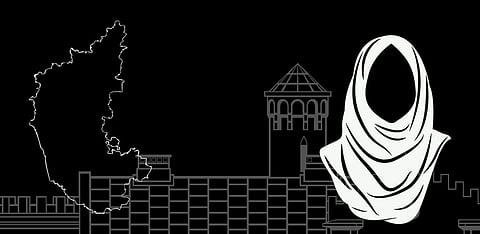

The Karnataka hijab ban which was imposed in December 2021 continues to affect Muslim girl students disproportionately, especially after they could not receive any relief from the Karnataka High Court and then the Supreme Court which delivered a split verdict in October 2022 and referred the matter to a larger Bench which is yet to be constituted.
—
OCTOBER 13, 2023, marked one year since the Supreme Court Bench of Justices Hemant Gupta and Sudhanshu Dhulia delivered a split verdict on the hijab ban imposed in pre-university colleges in Karnataka.
Last year, several petitions were filed at the Supreme Court challenging the ban on wearing the hijab in educational institutions in Karnataka.
The entire controversy began when six Muslim girl students were denied entry into their classrooms in Udupi in December 2021.
The ban was based on the Karnataka Government Order on Dress Code for Students (GO), issued under the Karnataka Education Act, 1983.
The GO was challenged before the High Court of Karnataka, which upheld it.
The Karnataka High Court decision was challenged before the Supreme Court, which gave the split verdict.
The matter was referred to a larger Bench which is yet to be constituted.
The matter has come up before the Chief Justice of India (CJI) Dr D.Y. Chandrachud for listing many times throughout the year.
When it came before the CJI in January, the court agreed to consider listing the plea for interim directions. The plea concerned some of the Muslim students who were on the verge of losing an academic year because of the ban. However, nothing happened.
The plea was mentioned again in February. However, the court did specify any date for listing the matter.
Third time was not a charm because when the matter was mentioned on March 3, the exams of the girl students were due in five days. This time too, they failed to get any relief as the court did not specify any date for listing the matter. The CJI added that this was a last minute request and he would be able to accommodate it.
The CJI orally stated that he would list the matter after Holi vacations and constitute an appropriate Bench for the same.
The operative part of the Supreme Court's judgment stated, "In view of the divergent opinions expressed by the Bench, the matter is placed before the Chief Justice of India for the constitution of the appropriate Bench."
Justice Gupta's judgment observed that the Karnataka Order was to ensure parity amongst the students in terms of uniforms. As per his judgment, it promotes uniformity and encourages a secular environment in schools. Thus, it was in accordance with Article 14 (right to equality) of the Constitution.
Further, he wrote that restrictions on freedom of religion and conscience have to be read conjointly with other provisions of Part III of the Constitution. Thus, the state law has primacy over the proposed right to freedom of religion, if the State wants to regulate secular aspects connected to religion.
Whereas Justice Dhulia, while rejecting the need to determine whether the practice of wearing hijab constituted an essential religious practice within Islam, emphasised the right to freedom and dignity of the individuals.
According to him, discipline in schools is necessary, but not at the cost of an invasion of privacy and dignity of girl students who were asked to remove their hijab at the school gate. He ultimately concluded that the invasion of their privacy and the attack on their dignity is a denial of secular education, and thus a violation of their rights under Articles 19(1)(a) (right to freedom of speech and expression), 21 (right to life and personal liberty) and 25(1) (freedom of religion) of the Constitution.
A recent study by the human rights body, People's Union for Civil Liberties—Karnataka, titled Closing the Gates of Education: Violations of the rights of Muslim women students in Karnataka, found that the hijab ban has resulted in the dropout of more than 800 girl students in Karnataka. Over 400 girl students have been denied entry to or suspended from college and missed classes because of it in the state.